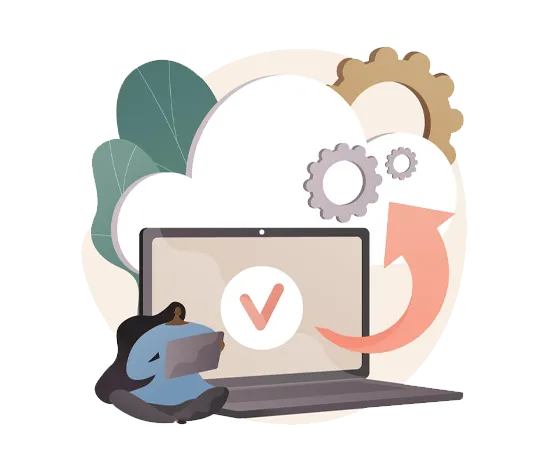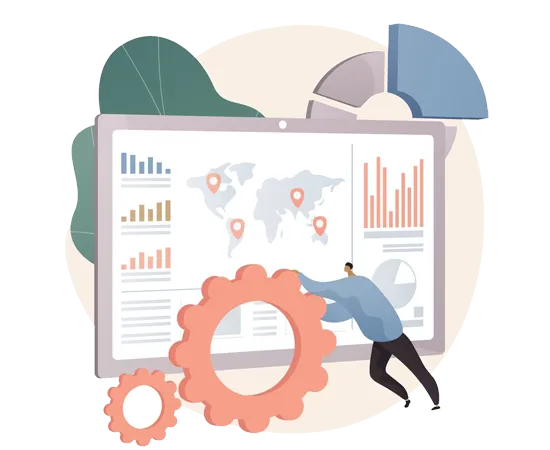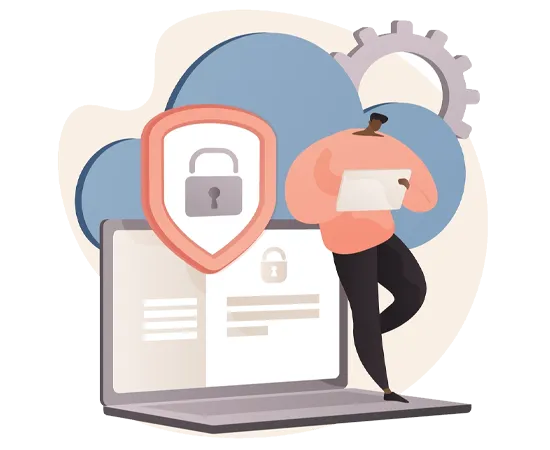IT infrastructure is the foundational framework that helps organizations function efficiently, innovate, and adapt to changing business environments. It plays a critical role in almost every aspect of business operations today, making its design, maintenance, and continuous improvement imperative for success.
A robust IT infrastructure ensures that business operations run seamlessly, increasing overall productivity.
Modern and efficient infrastructure can differentiate a business, offering faster and more reliable services than competitors.
Streamlined and updated infrastructure can lead to cost savings in the long run by reducing downtime and maintenance needs.
With the right infrastructure, businesses can deploy new solutions, applications, or technologies to stay ahead in the market.
In the face of unexpected events, a well-established IT infrastructure ensures that businesses can quickly recover and maintain essential functions.
Modern IT infrastructure promotes collaboration, allowing teams to work together across geographical boundaries.
- Private & Public Cloud Infrastructure
- Hyper-converged Infrastructure
- Backup & Disaster Recovery
- Enterprise Security System
- Office Automation and Identity Management

Private & Public Cloud Infrastructure
Drawing on the power of pervasive virtualization technologies, particularly from industry leaders like VMware and Microsoft, we guide our clients on a transformative journey to realize the potential of utility computing. In this realm, servers are not just tools but utilities—provisioned with the immediacy akin to turning on a tap or illuminating a bulb. This ensures that server resources are dispensed precisely when end users demand, and conversely, retracted once their requirements cease.
For organizations yearning for flexibility and strategic deployment, we provide an array of options. Be it harnessing the expansive reach of the Public Cloud, the tailored security of the Private Cloud, or the adaptive synergy of a hybrid model, we have solutions crafted for every need.
Technologies We Harness:
Datasheet:
A hybrid cloud platform that allows enterprises to deliver Azure services from their own datacenter, bridging on-premises environments with Azure cloud services.
Datasheet:
Hyper-Converged Infrastructure (HCI)
Hyperconverged Infrastructure (HCI) is a modern IT framework that combines compute, storage, and networking components into a single, integrated system, aiming to simplify data center operations and enhance scalability. Here’s a more detailed breakdown:

Unlike traditional data centers that manage storage, compute, and networking as separate entities, HCI integrates these elements. This means that instead of having separate servers, storage networks, and storage arrays, HCI converges all these components into a single system.
The primary driving force behind HCI is software. While it does require hardware (like servers), the intelligence and operations are managed by software layers. This software-centric nature allows for flexibility, automation, and easy scalability.
One of the key features of HCI is its modular scalability. As the organization grows, you can simply add more modules (or nodes) to the infrastructure, expanding resources without the complexities of traditional architectures.
HCI solutions often come with unified management platforms, allowing administrators to manage all resources from a single interface. This simplifies tasks like provisioning, automation, and monitoring.
By consolidating resources and offering software-defined operations, HCI can lead to reduced capital and operational expenditures.
HCI platforms are designed to be resilient. They often include features like data replication, automated backups, and disaster recovery solutions built into the platform.
In essence, Hyperconverged Infrastructure represents a shift towards simplicity and agility in the data center, making it an attractive solution for businesses looking to streamline operations and reduce the complexities associated with traditional IT architectures.
Technologies We Harness:
Software-defined storage solution integrated with VMware’s vSphere, enabling the creation of distributed, shared storage using the hard drives or SSDs of the servers in a virtualized environment.
Datasheet:
An integrated software solution that combines compute, storage, and virtualization in a single platform, simplifying data center operations and providing scalable, unified infrastructure.
Datasheet:
A hyperconverged infrastructure solution that integrates compute, storage, and networking into one unified system, aiming to simplify data center management and enhance operational efficiency.
Datasheet:

IT Backup & Disaster Recovery: The Lifelines of Digital Business
In today’s digital age, IT Backup and Disaster Recovery stand as essential pillars ensuring business resilience and data integrity. Enterprises will achieve the following benefits when they have a robust IT Backup and Disaster Recovery platform:
These systems are safeguards against unforeseen disruptions, whether natural calamities or cyberattacks, ensuring operations remain uninterrupted.
As data becomes an invaluable asset, backups protect it from accidental losses, system failures, or malicious threats.
Many industries face stringent data protection and retention mandates. Backup and recovery mechanisms ensure compliance, avoiding legal repercussions and penalties.
By minimizing downtimes and preventing data loss, businesses avoid financial setbacks, from lost sales to potential compensation claims.
In widespread disruptions, a swift recovery can position a business ahead of competitors.
With escalating cyber threats, especially ransomware, backups provide an avenue to restore data without capitulating to ransom demands.
Efficient recovery tools ensure services resume promptly, mitigating revenue losses.
Backups allow businesses to revert to desired operational states, like before a problematic software update.
In essence, IT Backup and Disaster Recovery are not mere contingency plans but foundational strategies, fortifying businesses against disruptions and ensuring they thrive in a dynamic digital ecosystem.
Technologies We Harness:
An advanced data protection software tailored for virtual environments, offering seamless backup and replication for VMware vSphere and Microsoft Hyper-V platforms. It boasts capabilities like instant VM recovery, efficient data deduplication, and automated recovery verification, ensuring optimal data availability and streamlined management.
Datasheet:
Cohesity Data Management Software:
Cohesity provides an AI-powered integrated data management platform, centralizing backup, recovery, storage, and analytics. With its web-scale design, Cohesity eradicates data silos, enhances storage optimization, and guarantees swift, dependable data retrieval, supported by insightful analytics and effortless scalability.
Datasheet:
Enterprise Security System
Here are some key benefits of implementing an enterprise security system:

Enterprise security systems help in maintaining the confidentiality of sensitive data by preventing unauthorized access.
They ensure the integrity of data by preventing unauthorized modifications or tampering.
Security systems can detect and respond to potential threats in real-time, helping to mitigate risks before they escalate.
Regular scanning and monitoring help identify and address vulnerabilities in the organization’s network and systems.
Enterprise security systems assist in meeting regulatory requirements and standards, ensuring that the organization operates within legal and industry-specific frameworks.
Security measures help ensure the availability of critical systems and services, reducing the risk of downtime due to security incidents.
Security systems include measures to detect and prevent ransomware and malware.
In summary, enterprise security systems play a crucial role in protecting an organization’s assets, maintaining operational continuity, and fostering a secure and trustworthy environment.
Technologies We Harness:
Trend Micro Security Solution:
Trend Micro employs advanced cybersecurity technologies to protect users and organizations from an array of online threats. The company’s technology portfolio encompasses a range of solutions, including sophisticated antivirus and anti-malware software, cloud security offerings, and endpoint protection systems.
Datasheet:

Office Automation and Identity Management
Microsoft 365 is more than just a software. It is a solution that empowers you to achieve more with your business. That is why Zen is a trusted partner and reseller of Microsoft 365, the cloud-based productivity suite that offers flexibility, reliability, and security.
Technologies We Harness:
is a cloud-based productivity suite that offers a range of features and benefits for individuals and businesses. Some of the features of Microsoft 365 are:
You can access the latest versions of Office apps, such as Word, Excel, PowerPoint, and Outlook, on any device and from any location. You can also use online versions of Office apps or download them to your device for offline use.
You get 1 TB of OneDrive cloud storage, where you can store, share, and sync your files across your devices. You can also access your files from any web browser or use the OneDrive app on your device.
You can work together with your colleagues or friends on documents, spreadsheets, presentations, and more. You can co-author in real time, chat, comment, and share your files with others. You can also use Microsoft Teams, a hub for teamwork, where you can create and join online meetings, chat, call, and collaborate on projects.
You can use artificial intelligence and machine learning to enhance your productivity and creativity. For example, you can use Ideas in Excel to get insights and suggestions for your data, use Researcher in Word to find and cite reliable sources for your paper, use Designer in PowerPoint to create professional-looking slides, and use Editor in Word to improve your writing.
You can protect your data and devices from online threats and unauthorized access. You can use features such as ransomware detection and recovery, two-factor authentication, encryption, and password protection. You can also manage your privacy settings and control who can access your files and information.

Zen Computer Systems Sdn Bhd
4808-1-28, CBD Perdana 2, Persiaran Flora,
Cyber 12, 63000, Cyberjaya, Selangor,
Malaysia.







